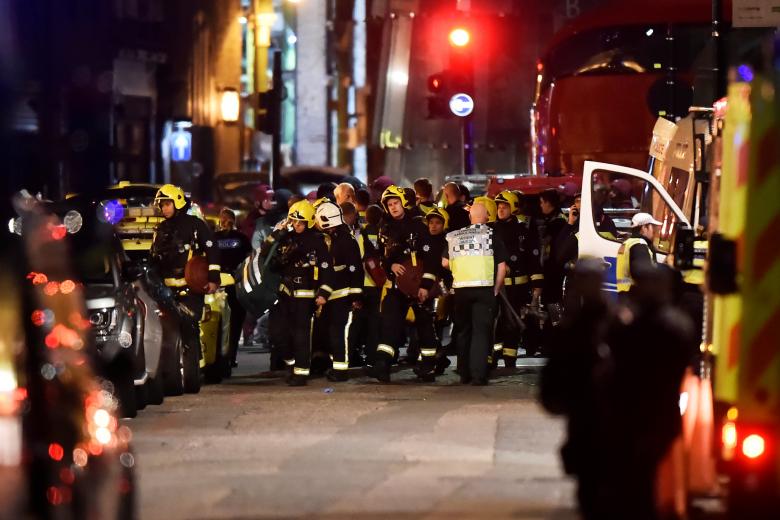London — After three years of attacks in Europe in which security services frequently struggled to explain how the perpetrators were able to avoid detection, Britain is wrestling with a different question in the wake of Saturday’s attack: How could three extremists strike in the heart of London when at least two of them had been known to authorities?
One of the attackers, Khuram Shazad Butt, was certainly not hiding his radical views.
In fact, he had revealed them to millions of TV viewers in the 2016 documentary “The Jihadis Next Door.”
What should have raised even more alarm, according to experts, was the connection between Butt and possibly another of the attackers to a well-known radical British group called al-Muhajiroun. Counterterrorism analysts had called for a crackdown on the group and its offshoots for years. Now they wonder whether a tougher approach could have saved lives and whether there are lessons for other countries with locally entrenched extremist groups.
It remains unclear under what circumstances the three attackers met, but researchers have linked al-Muhajiroun to a number of successful and foiled British terrorist plots over the past two decades. The group is officially banned, but it has operated relatively freely.
A longtime al-Muhajiroun leader, Anjem Choudary, tested the boundaries of Britain’s freedom-of-speech laws with his fiery exhortations and encountered little resistance from authorities until 2015, when the cleric was charged with inviting support for ISIS. He was later sentenced to five-and-a-half years in jail.
“These men have stayed just within the law for many years,” Dean Haydon, head of the London police counterterrorism command, said in a statement last year, referring to Choudary and co-defendant Mohammed Rahman. “There is no one within the counterterrorism world that has any doubts of the influence that they have had, the hate they have spread and the people that they have encouraged to join terrorist organizations.”
Choudary’s arrest followed a strategy change by London counterterrorism authorities and was seen as an acknowledgment that the wait-and-see approach had failed. But it might have come too late to reverse the damage in Britain and across Europe. Being allowed to travel across the continent, the hate preacher had provided assistance and support to extremist groups elsewhere and extended his network in Britain.
“There had always been a debate between the police, who wanted to arrest key figures, and intelligence services, who wanted to keep extremist groups like al-Muhajiroun intact, in order to monitor their members,” said Peter Neumann, director of the London-based International Center for the Study of Radicalization. “It’s a balancing act which can go wrong.” Allowing Choudary to continue his operations, Neumann said, let the cleric radicalize people who perhaps would not have been attracted to extremism.
Some of them ended up joining ISIS in Syria and Iraq. Others plotted attacks closer to home.
The criticism also extends to Prime Minister Theresa May, who was Britain’s home secretary until last year and for whom the latest bloodshed in London — the attack killed eight people — became a major factor in Thursday’s election.
With less than 24 hours before polls opened, May attempted to seize back the initiative Wednesday by suggesting that she would change laws to fight the terrorist threat.
“If human rights laws get in the way of doing these things, we will change those laws to make sure we can do them,” May told the Sun, which endorsed the Conservative Party on Wednesday.
Her opponents said she was trying to divert attention from mounting criticism over police funding cuts undertaken during her six-year stint as home secretary. May oversaw the controversial cuts, which resulted in the elimination of about 20,000 officer staff positions and prompting concerns about Britain’s ability to prevent attacks.
At least 3,000 people in Britain pose a potential terrorism threat, said one official who until recently worked in a counterterrorism position. Thousands more sympathize with or support militant groups, the official said, speaking on the condition of anonymity because he was not authorized to discuss the matter publicly.
To monitor one suspect day and night requires 20 officers on average, amounting to about half of the nation’s officers if the government wanted to put all high-risk suspects under surveillance.
The inability to monitor all suspects has resulted in several high-casualty attacks. In the case of the July 7, 2005, London bombings, authorities had been initially monitoring some of the suspects before they struck but had failed to notice early warning signs, a parliamentary committee concluded. More recently, the suicide bomber who struck in Manchester two weeks ago had been reported to authorities by concerned residents but was not put under surveillance.
“To make such a decision, authorities likely consider factors like associates of the suspects, foreign connections as well as connections with militant groups to determine whether to invest time and resources on an individual,” said Otso Iho, a senior analyst with IHS Jane’s Terrorism and Insurgency Center. “But because more terrorists refrain from using illicit materials to prepare their attacks, their prevention has become much harder. Hence, authorities also need to look at possible networks and social circles in which those people are embedded and may be radicalized in.”
It is a logic that puts authorities in an uncomfortable position, given that the easiest way to monitor the social circles of suspects is to keep their networks intact. But as Saturday’s attack has shown, it is a strategy that poses serious risks if people slip through.
One of the attackers, 22-year-old Moroccan Italian Youssef Zaghba, was stopped by Italian authorities in March 2016 while on his way to Turkey to presumably join ISIS. Speaking to the BBC, his mother said she told Zaghba after the incident: “You have to be perfect now. You can’t look at strange things on the Internet or meet strange people.”
Instead, he traveled to London and disappeared from authorities’ radar — June 3.
